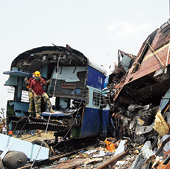 |
| The Jnaneswari Express after it jumped rails |
Survivors of the Jnaneswari Express derailment and its collision with a goods train two weeks ago have refused to travel by train to Kharagpur to retrieve their luggage.
“We had requested several passengers, who were injured and have now recovered, to take a train to Kharagpur and identify their luggage. A number of them refused, saying they had developed a phobia about trains. They requested us to take them to Kharagpur by road,” said a senior official of South Eastern Railway.
“Railway officials had offered to take me to Kharagpur by train to get my luggage but I cannot even think of boarding a train again,” said 42-year-old Sushmita Guha, who runs a consultancy firm in Delhi, where she had recently shifted from Mumbai. Sushmita was going to Mumbai with her brother Subhashis for shifting some belongings to Delhi. She was in coach S5 and her brother in S4 when the Jnaneswari Express jumped rails near Jhargram and was hit by the goods train coming from the opposite direction.
Sushmita was thrown against a wall of her coach and suffered multiple injuries. She crawled under the engine of the goods train and stayed there till she was rescued several hours later. She is now recovering in her Jadavpur home. “I saw bodies scattered everywhere. The scenes are haunting me constantly. I am petrified of boarding a train again,” she added.
Mala Sen, 48, who was in coach S3, is grappling with similar fears. She, her husband Suvro and their 15-year-old son Saurabh and 22-year-old daughter Sreya had come to Calcutta to attend a relative’s wedding. Sreya’s right arm had to be amputated. She is admitted to AMRI Hospitals, Dhakuria.
“If we even try to go near a train, the horrifying memories of the night would rush back,” said Mala.
Psychiatrists and psychologists said it could take the survivors years to overcome their phobia.
“They are suffering from post-traumatic stress disorder. Its effect can be felt a few days after an incident. The sight of so many bodies has resulted in severe shock. Some survivors might become severely depressed,” said city-based psychiatrist Ranadip Ghosh Roy. According to him, post-traumatic stress disorder generally lasts from six months to a year but for some, it can last a lifetime. “In such cases, counselling is needed.”
Psychologist Tapashi Mitra felt the near-death experience had left scars on the survivors’ minds. “Being stuck in a coach among bodies, uncertain whether one would be rescued or not, added to the shock,” she said.











